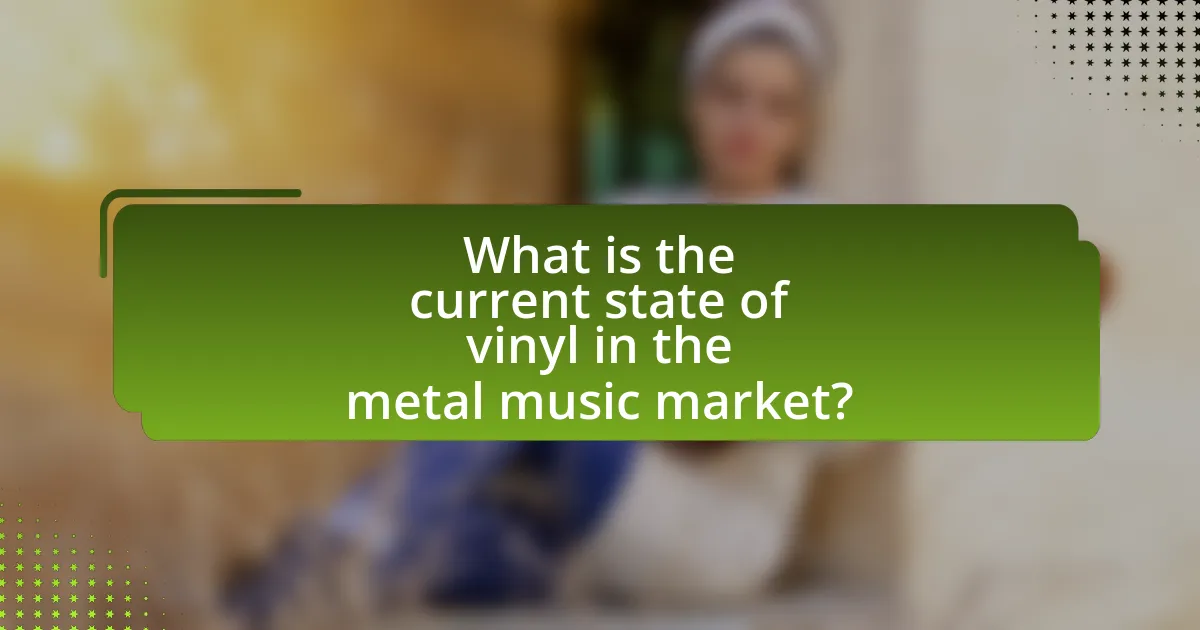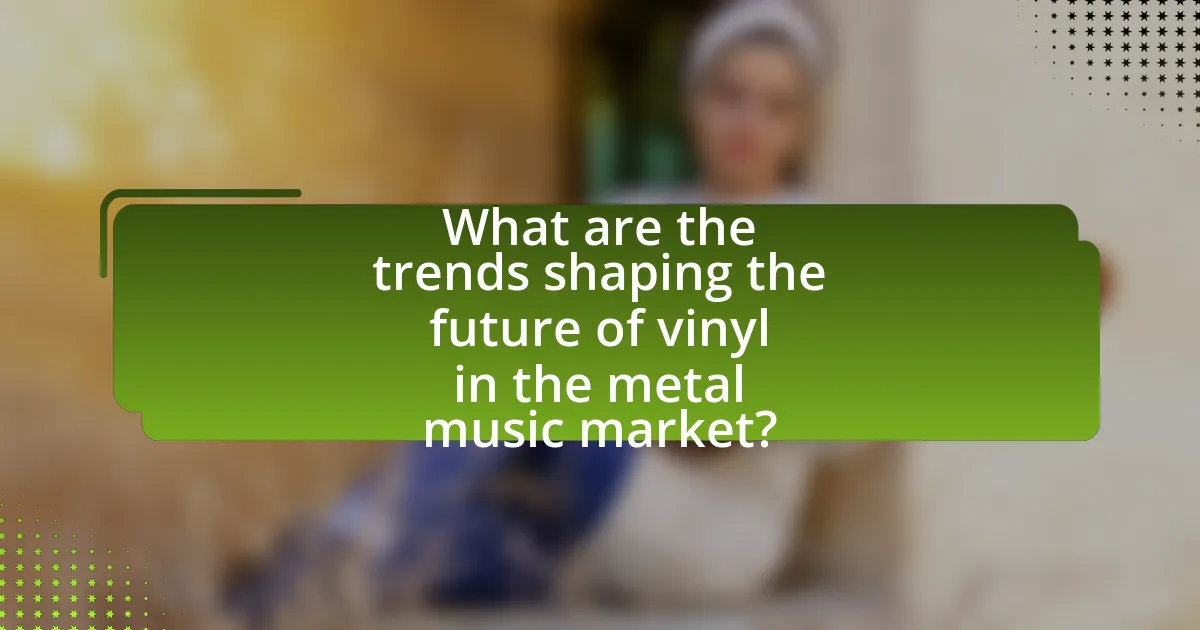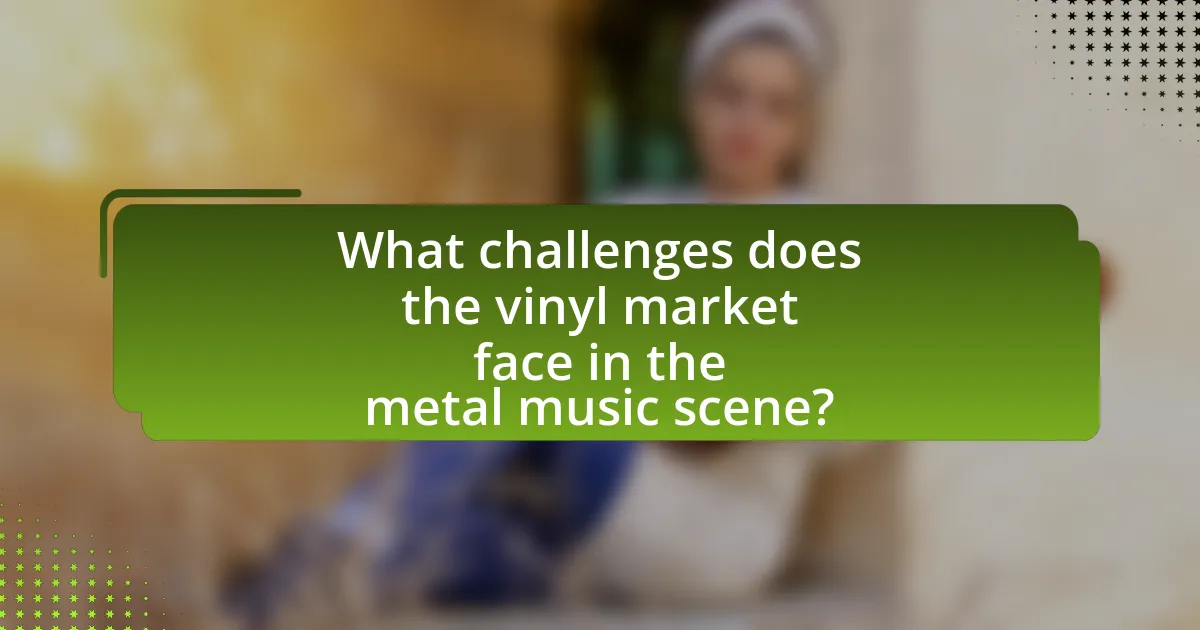The main entity of the article is the resurgence of vinyl records within the metal music market. The article provides an overview of the current state of vinyl sales, highlighting a significant increase in demand, particularly among metal enthusiasts, with sales reaching 41 million units in 2022. It discusses the factors contributing to this trend, including nostalgia, superior sound quality, and the collectible nature of vinyl. Additionally, the article examines how metal bands are adapting to this revival through limited edition releases and direct-to-consumer sales, while also addressing challenges such as production limitations and environmental concerns associated with vinyl manufacturing. The piece concludes by offering practical tips for fans on purchasing and caring for vinyl records.

What is the current state of vinyl in the metal music market?
The current state of vinyl in the metal music market is experiencing a significant resurgence, with sales increasing steadily over the past decade. According to the Recording Industry Association of America (RIAA), vinyl sales in the U.S. reached 41 million units in 2022, marking the highest level since the 1980s, and metal albums are among the top genres contributing to this growth. Notably, bands like Metallica and Iron Maiden have released special edition vinyl records, catering to both collectors and new fans, which further solidifies vinyl’s popularity in the metal genre. This trend indicates a robust demand for vinyl among metal enthusiasts, reflecting a broader cultural shift towards physical media in music consumption.
How has the popularity of vinyl records changed in recent years?
The popularity of vinyl records has significantly increased in recent years. According to the Recording Industry Association of America (RIAA), vinyl sales reached 41 million units in 2022, marking the highest sales figures since the 1980s. This resurgence is driven by a growing interest in physical media among music enthusiasts, collectors, and younger generations who appreciate the tactile experience and sound quality of vinyl. Additionally, the trend is supported by the rise of independent record labels and artists releasing special editions and exclusive content on vinyl, further fueling consumer demand.
What factors have contributed to the resurgence of vinyl in the music industry?
The resurgence of vinyl in the music industry is primarily driven by a combination of nostalgia, superior sound quality, and the collectible nature of vinyl records. Nostalgia plays a significant role as consumers, particularly millennials and Gen Z, seek tangible music experiences reminiscent of past eras. The superior sound quality of vinyl, often described as warmer and richer compared to digital formats, appeals to audiophiles and casual listeners alike. Additionally, the collectible aspect of vinyl records, with limited editions and unique artwork, enhances their desirability, leading to increased sales. According to the Recording Industry Association of America (RIAA), vinyl sales reached 41 million units in 2020, marking the highest level since 1986, which underscores the growing consumer interest in this format.
How does vinyl appeal to metal music fans specifically?
Vinyl appeals to metal music fans specifically due to its superior sound quality and tangible connection to the music. The analog format of vinyl records captures the full dynamic range of metal music, allowing fans to experience the depth and intensity of the genre more vividly than digital formats. Additionally, the large album artwork and physical presence of vinyl create a more immersive experience, enhancing the appreciation of the band’s visual and artistic elements. The resurgence of vinyl in recent years, with sales reaching over 40 million units in the U.S. in 2020, indicates a strong demand among collectors and enthusiasts, particularly within niche genres like metal. This trend is supported by the fact that many metal bands release special edition vinyl, catering to fans who value limited releases and collectible items.
What role does vinyl play in the overall metal music culture?
Vinyl plays a significant role in the overall metal music culture by serving as a tangible medium for music appreciation and collector’s items. The resurgence of vinyl in recent years has been particularly pronounced in the metal genre, where album artwork and packaging are often integral to the artistic expression of the music. According to the Recording Industry Association of America (RIAA), vinyl sales have seen a consistent increase, with metal bands frequently releasing special edition vinyl records that cater to collectors and fans. This trend not only enhances the listening experience but also fosters a sense of community among fans who value the physical format and its associated culture.
How do collectors influence the demand for vinyl in the metal genre?
Collectors significantly influence the demand for vinyl in the metal genre by driving up interest and prices for rare and limited-edition releases. Their pursuit of unique pressings, such as colored vinyl or special editions, creates a competitive market that elevates the perceived value of these records. For instance, the resurgence of vinyl sales in recent years, with the Recording Industry Association of America reporting that vinyl sales reached 27.5 million units in 2021, highlights how collectors’ enthusiasm contributes to overall demand. Additionally, collectors often participate in niche communities and events, further promoting metal vinyl releases and encouraging new listeners to engage with the format.
What are the cultural implications of vinyl records for metal artists?
Vinyl records hold significant cultural implications for metal artists, as they symbolize authenticity and a deep connection to the genre’s roots. The resurgence of vinyl in the metal scene reflects a desire for tangible music experiences, contrasting with the digital consumption trends. This format allows artists to present their work in a visually impactful manner, often incorporating elaborate artwork and packaging that resonate with the metal aesthetic. Furthermore, vinyl releases often foster a sense of community among fans, as collectors seek limited editions and exclusive content, enhancing the overall engagement with the music. The cultural significance is underscored by the fact that many metal bands, such as Metallica and Iron Maiden, have embraced vinyl releases, reinforcing its status as a cherished medium within the genre.

What are the trends shaping the future of vinyl in the metal music market?
The future of vinyl in the metal music market is being shaped by a resurgence in vinyl sales, driven by collector interest and the desire for high-quality audio experiences. In 2022, vinyl sales in the U.S. reached 41 million units, with metal genres seeing significant growth as fans seek tangible formats for their favorite albums. Additionally, limited edition releases and colored vinyl variants are becoming increasingly popular, appealing to collectors and enhancing the aesthetic value of metal albums. The trend of artists engaging directly with fans through exclusive vinyl releases on platforms like Bandcamp further supports this growth, as it fosters a community around physical music formats.
How are metal bands adapting to the vinyl revival?
Metal bands are adapting to the vinyl revival by increasing their vinyl releases and offering exclusive editions to cater to collectors. In recent years, the resurgence of vinyl has led many metal bands to produce limited runs of their albums on vinyl, often featuring unique artwork, colored vinyl, and bonus tracks. For instance, in 2021, Metallica released a special edition of their classic album “Master of Puppets” on vinyl, which sold out quickly, demonstrating the demand for vinyl among metal fans. Additionally, bands are utilizing platforms like Bandcamp to sell their vinyl directly to fans, enhancing their connection with the audience and capitalizing on the growing trend of vinyl collecting in the metal genre.
What strategies are metal artists using to release vinyl records?
Metal artists are utilizing limited edition releases, crowdfunding campaigns, and direct-to-consumer sales to release vinyl records. Limited edition releases create exclusivity and drive demand, as seen with bands like Metallica and Iron Maiden, who often produce colored vinyl or special packaging. Crowdfunding platforms like Kickstarter allow artists to gauge interest and secure funding before production, exemplified by projects from bands such as Blind Guardian. Additionally, direct-to-consumer sales through band websites and social media enable artists to maintain higher profit margins and connect directly with their fanbase, as demonstrated by many independent metal bands successfully selling vinyl directly to fans.
How do limited edition vinyl releases impact sales and fan engagement?
Limited edition vinyl releases significantly boost sales and enhance fan engagement in the metal music market. These exclusive products create a sense of urgency and scarcity, leading to increased demand; for instance, a study by the Recording Industry Association of America (RIAA) reported that vinyl sales reached a 30-year high in 2020, largely driven by limited edition releases. Additionally, fans often feel a deeper connection to their favorite artists when they own unique items, fostering loyalty and community among listeners. This engagement is evidenced by social media interactions and fan-driven events centered around these releases, which further solidify the bond between artists and their audience.
What technological advancements are influencing vinyl production?
Technological advancements influencing vinyl production include digital cutting technology, improved vinyl formulations, and automated pressing machines. Digital cutting technology allows for precise and efficient creation of master discs, enhancing sound quality and reducing production time. Improved vinyl formulations, such as the use of high-quality PVC and additives, result in better durability and sound fidelity. Automated pressing machines increase production efficiency and consistency, enabling manufacturers to meet rising demand in the vinyl market, which has seen a resurgence, particularly in genres like metal music. According to the Recording Industry Association of America, vinyl sales reached a 30-year high in 2020, underscoring the impact of these advancements on the industry.
How has the quality of vinyl records improved over time?
The quality of vinyl records has improved significantly over time due to advancements in manufacturing processes and materials. Modern vinyl records are produced using higher-quality polyvinyl chloride (PVC), which enhances durability and sound fidelity compared to earlier formulations. Additionally, contemporary pressing techniques, such as precision temperature control and digital mastering, have led to reduced surface noise and improved dynamic range. For instance, the introduction of 180-gram vinyl has become a standard for premium releases, providing a sturdier product that minimizes warping and enhances audio quality. These improvements have been documented in various industry reports, highlighting a resurgence in vinyl popularity driven by superior sound reproduction and collector interest.
What innovations in pressing techniques are emerging in the metal genre?
Innovations in pressing techniques emerging in the metal genre include the use of advanced vinyl formulations, such as high-definition vinyl, which enhances sound quality and durability. Additionally, techniques like color vinyl pressing and picture discs are becoming more prevalent, allowing for unique aesthetic presentations that appeal to collectors. The adoption of eco-friendly materials and processes is also gaining traction, reflecting a growing awareness of sustainability within the industry. These advancements are supported by technological improvements in pressing machinery, which enable more precise and efficient production, ultimately benefiting both artists and consumers in the metal music market.

What challenges does the vinyl market face in the metal music scene?
The vinyl market in the metal music scene faces significant challenges, primarily due to production limitations and market demand fluctuations. Production of vinyl records is often hindered by a shortage of pressing plants, which can lead to long wait times for new releases. Additionally, the metal genre’s niche audience may not always support the high costs associated with vinyl, limiting sales potential. According to the Recording Industry Association of America, vinyl sales have increased overall, but specific genres like metal may struggle to maintain consistent demand compared to more mainstream genres. This combination of production bottlenecks and variable consumer interest creates a challenging environment for the vinyl market within the metal music scene.
How do production costs affect the availability of vinyl records?
Production costs significantly influence the availability of vinyl records by determining the pricing and production volume. High production costs, driven by factors such as raw material prices, manufacturing processes, and labor, can lead to increased retail prices for vinyl records. For instance, the cost of PVC, the primary material for vinyl records, has fluctuated due to supply chain issues and increased demand, impacting how many records can be produced affordably. Consequently, when production costs rise, manufacturers may limit their output or increase prices, resulting in fewer records available in the market. This relationship is evident in the resurgence of vinyl, where limited pressings often occur due to high costs, making certain titles harder to find.
What are the implications of supply chain issues on vinyl releases?
Supply chain issues significantly delay vinyl releases, impacting availability and sales. These disruptions can arise from shortages of raw materials, such as PVC, which is essential for vinyl production. For instance, the COVID-19 pandemic caused widespread factory closures and transportation delays, leading to a backlog in production schedules. As a result, artists and labels face extended wait times for pressing records, which can hinder promotional efforts and limit market presence. Additionally, increased production costs due to supply chain constraints can lead to higher retail prices, potentially reducing consumer demand. The overall effect is a constrained market for vinyl records, particularly in niche genres like metal, where timely releases are crucial for maintaining fan engagement and sales momentum.
How does the digital music landscape impact vinyl sales in metal music?
The digital music landscape positively impacts vinyl sales in metal music by driving interest in physical formats among collectors and enthusiasts. As streaming services provide easy access to a vast array of music, metal fans often seek tangible products, such as vinyl records, to enhance their listening experience and support their favorite artists. According to a report by the Recording Industry Association of America (RIAA), vinyl sales in the U.S. reached 41 million units in 2020, marking a 29% increase from the previous year, with metal genres contributing significantly to this growth. This trend indicates that the accessibility of digital music can lead to increased demand for vinyl, as fans desire a physical representation of their digital playlists.
What are the environmental concerns associated with vinyl production?
Vinyl production raises significant environmental concerns primarily due to the use of polyvinyl chloride (PVC), which is a petroleum-based plastic. The production process of PVC involves the release of harmful chemicals, including dioxins, which are known to be toxic and can persist in the environment. Additionally, the manufacturing of vinyl records generates considerable waste and energy consumption, contributing to carbon emissions. According to a study by the European Commission, the lifecycle of vinyl records, from production to disposal, can result in substantial greenhouse gas emissions, estimated at around 1.5 kg of CO2 per record. Furthermore, the disposal of vinyl records poses challenges, as PVC is not biodegradable and can lead to long-term pollution in landfills.
How are metal labels addressing sustainability in vinyl manufacturing?
Metal labels are addressing sustainability in vinyl manufacturing by adopting eco-friendly production practices and materials. These labels are increasingly using recycled vinyl and sustainable packaging options, which significantly reduce the environmental impact associated with traditional vinyl production. For instance, some metal labels have reported using up to 50% recycled materials in their vinyl records, thereby minimizing waste and resource consumption. Additionally, initiatives such as carbon offset programs and partnerships with environmentally conscious suppliers further enhance their commitment to sustainability. This shift not only aligns with consumer demand for greener products but also contributes to the overall reduction of the carbon footprint in the music industry.
What alternatives to traditional vinyl are being explored in the industry?
Alternatives to traditional vinyl being explored in the industry include eco-friendly materials such as recycled PVC, bioplastics, and plant-based polymers. These alternatives aim to reduce environmental impact while maintaining sound quality. For instance, companies like Vinyl Me, Please have begun using recycled materials to produce records, which can significantly lower carbon footprints. Additionally, bioplastics derived from renewable resources are being tested for their potential to replace conventional vinyl without compromising audio fidelity.
What practical tips can metal fans consider when purchasing vinyl?
Metal fans should prioritize purchasing vinyl records from reputable sellers to ensure quality and authenticity. When buying, fans should check for the condition of the vinyl, looking for scratches or warps that could affect sound quality. Additionally, researching the pressing information is crucial; limited editions or colored vinyl often have higher value and better sound quality. Fans should also consider the label’s reputation, as established labels typically produce higher-quality pressings. Finally, reading reviews and seeking recommendations from fellow collectors can provide insights into the best options available.
How can fans identify quality vinyl records in the metal genre?
Fans can identify quality vinyl records in the metal genre by examining the pressing quality, label reputation, and mastering techniques used. High-quality pressings typically feature a heavier weight, such as 180 grams, which reduces warping and enhances sound fidelity. Reputable labels like Metal Blade and Nuclear Blast are known for their commitment to quality, often using superior materials and processes. Additionally, records that have been mastered specifically for vinyl, as opposed to digital formats, tend to provide a richer audio experience, capturing the nuances of metal music more effectively.
What are the best practices for caring for vinyl records to ensure longevity?
To ensure the longevity of vinyl records, it is essential to handle them with care, store them properly, and clean them regularly. Handling records by holding them by the edges prevents fingerprints and oils from damaging the grooves. Proper storage involves keeping records upright in a cool, dry environment away from direct sunlight, which can warp and fade them. Regular cleaning with a carbon fiber brush or a specialized vinyl cleaning solution removes dust and debris that can cause surface noise and wear. These practices are supported by the fact that maintaining optimal conditions can significantly extend the lifespan of vinyl records, allowing for better sound quality and preservation of the music.



